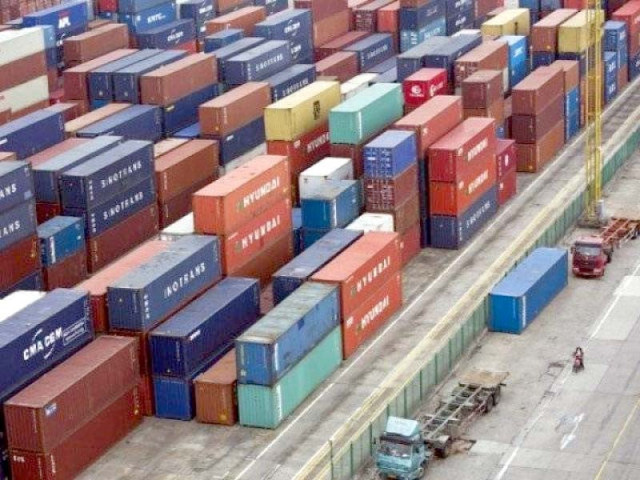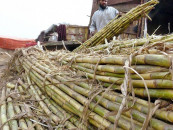Govt tightens transit trade import regime
Move aims at preventing misuse of ATTA, protecting economy from damage caused by smuggling

Pakistan on Tuesday banned the import of goods, prone to smuggling to Afghanistan through its territory, as it made the import regime stringent in a decisive move to stop the damage inflicted on the national economy and the external sector because of the misuse of the Afghan Transit Trade Agreement (ATTA).
The government took a host of measures, including a complete ban, imposition of 10% fee on some other imports, and a new condition of bank guarantees equal to duties and taxes in order to ensure that Afghanistan goods reached their final destination. These guarantees could be encashed in case the imported goods did not reach Kabul.
Essentially, Islamabad has used its economic leverage against Kabul –marking a major policy shift amid rising terror attacks on its soil.
To give effect to the new trade regime for Kabul, the commerce ministry and the Federal Board of Revenue (FBR) issued separate notifications.
In addition to banning certain smuggling-prone goods, Pakistan also slapped a 10% processing fee on import of chocolates, footwear, machinery, blankets and garments by Afghanistan through its territory.
In another action, new draft rules had been issued to govern Afghan imports whereby the Afghan importers would be required to submit bank guarantees. Two days had been given to raise objections against these draft rules and after the expiry of the deadline, these rules would become effective.
The commerce ministry notified a new list of negative items that the landlocked and war-torn economy could not import through Pakistani sea and border ports. The step had been taken keeping in view Afghanistan’s import requirements and its consumption patterns. Islamabad targeted only those goods which by no means Afghanistan was consuming.
The commerce ministry issued a statutory regulatory order (SRO) –a legal instrument to bring changes – and amended a 2004 order that governed the country’s import and export regime. It banned the import of tyres, black tea, nuts and dry fruits, fabrics, cosmetics, vacuum flasks and home appliances by Afghanistan under the ATTA.
“In exercise of the powers conferred by the Imports and Exports Control Act 1950, the federal government is pleased to direct that in its notification of 10th Day of March 2004, following new serial numbers and corresponding entries thereto shall be inserted,” the new notification read.
Read Import substitution should be part of industrial policy: Dagha
Being a landlocked country, Afghanistan has the right to import goods for its consumption through Pakistani sea and land ports. However, various government studies and intelligence reports had proven the misuse of the transit agreement.
The country decided to move only after reaching a consensus between the civil and military leadership at the Special Investment Facilitation Council (SIFC) meeting, according to the government officials involved in these discussions.
The smuggling of these goods back to Pakistan was also causing tax evasions of multibillion dollars. The Pakistani authorities were earlier reluctant to take steps due to involvement of its own people in facilitating the smuggling. But the deteriorating economic conditions and additional pressure on the value of the dollar due to settlement of most Afghan transit trade payments from Pakistani markets forced the country’s leadership to move against these elements.
It was a well-established notion throughout the customs and other law enforcement agencies that goods, which were smuggled into Pakistan, were often supplied by the Afghan transit trade containers, a 2015 report of the FBR, authored by its senior customs officer, Tariq Huda, read. The report remained on the shelf for the past eight years due to vested interests.
Huda’s report stated that the pilot study done at the beginning of the research project showed strong evidence that imports in Afghanistan of the selected commodities were too large in number and were not justified by the market demand.
During the course of this study, the customs authorities found that a large quantity of the smuggling was due to the ATTA cargo.
“Considering the quantum of the smuggling and its negative fallout for the economy and the country as a whole, Pakistan has to assign high priority to this issue in negotiations with Afghanistan and bring the matter up as one of the key demands with Afghanistan,” the FBR officer had recommended eight years ago.
The items identified in the report which were prone to smuggling had finally been banned for import under the transit trade. Pakistan has banned all types of home appliances, including television sets, refrigerators, electric goods, microwaves, speakers, fans and other such appliances for import through its territory.
Read more Massive under-invoicing scam unearthed in imports
According to the notification, the goods that had already reached Pakistan could still be transited to Afghanistan. However, the goods that were still in the high seas could not be transferred to Afghanistan and would have to be re-exported.
The goods being transited under the “foreign grant-in-aid to Afghanistan” were exempted from the ban.
The government study had revealed that the exponential increase in fabric, cooking oil, and a significant one in tyres could not be justified by the economic growth or an increase in market demand for these commodities in war-stricken Afghanistan.
The continuously higher levels of black tea coming into the country could not be justified for a country where the demand for green tea was significantly higher.
Similarly, the import of tyres for Afghanistan was not in line with its needs, indicating that these goods were smuggled back to Pakistan.
According to these statistics, Pakistan’s tyre demand should be about 14 times higher than Afghanistan. However, the imports were only about two to three times larger.
Similarly, the import of high-end name brand television sets to Afghanistan was significantly larger compared to Pakistan.
According to the FBR research, Pakistan was the fifth largest consumer of black tea in the world, while the only sector of society that drank black tea in Afghanistan were the Afghan refugees who had moved back to Afghanistan from Pakistan. This group represented about 10% of the total population.
The FBR on Tuesday also notified imposition of processing fee at the rate of 10% ad valorem on the Afghan transit commercial goods imported into Afghanistan in transit via Pakistan.
The fee had been imposed on the imports of confectionaries, chocolates, footwear, mechanical and electric machinery, blankets and home textile and garments, according to the notification.
The fee would not be applicable to the Afghan Transit Goods Declarations filed prior to the issuance of this notification. In yet another major step, the FBR issued the draft rules to regulate Afghan imports.
These rules would become effective from Thursday (tomorrow). “The bonded carrier or customs agent, filing the goods declaration (GD), shall be required to submit bank guarantee with the customs to cover the leviable duty and taxes in the GD for customs security,” according to new draft rules.
The GD would be assessed by the Customs Computerised System (CCS) or assessing officer on the pattern of the GDs filed for local home consumption.
The deputy or the assistant director, securities, of the office of departure shall be responsible for taking appropriate steps on a fortnightly basis for the timely reconciliation, encashment revalidation or physical release of bank guarantee, the rules stated.
In case of non-receipt of cross-border certificate along with exit stamp or non-fulfilment of any conditions against which the guarantee was furnished by the Afghan importer or exporter, the office concerned at the office of departure, shall take action for enforcement or encashment of the bank guarantee for the recovery of the government revenue involved therein, the notification added.
In a fourth notification, it had been made mandatory from Thursday (tomorrow) that a minimum of 25% consignments of transit goods shall be selected for scanning and a minimum of 10% for examination by the Risk Management System (RMS), while those consignments cleared by the RMS would be forwarded to the respective terminal operator for delivery and to the sealing officer for sealing.



















COMMENTS
Comments are moderated and generally will be posted if they are on-topic and not abusive.
For more information, please see our Comments FAQ